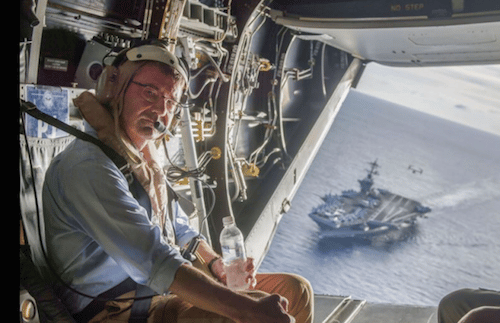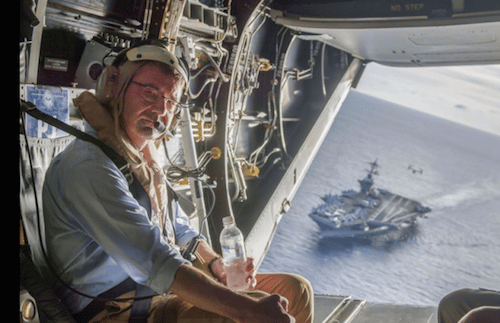
US Defense Secretary Ash Carter is a man who knows that actions speak far louder than words.
That’s why when Washington’s feud with China over the latter’s land reclamation efforts in the South China Sea reached a boiling point last year, Carter made a trip to the Pacific and had someone snap this picture of him riding in a helicopter with an aircraft carrier visible in the background.
All jokes aside, Carter is in somewhat of a tough spot. America’s disastrous foreign policy blunders in Ukraine, Syria, and Iraq and Washington’s bungled attempts to deal with an ascendant China, a resurgent Russia, and an Iran which is marking a triumphant return to the world stage, have left the defense chief with a laundry list of problems.
At the top of that list is ISIS.
Thanks to the fact that the group is the most effective force when it comes to destabilizing the Assad regime (an explicit foreign policy goal of the US and its regional allies) and thanks to the fact that the Russian intervention means the day will never come when Islamic State takes Damascus thus green-lighting a US ground invasion to “liberate” Syria, Washington has been forced to choose between either eliminating the group or keeping them around in hopes the Russians simply get bogged down and decide to let Assad fend for himself again.
Meanwhile, the attacks on Paris have left the public with a lot of burning questions about why America “can’t take those bastards out,” to quote senior White House correspondent Jim Acosta.
It is Carter who is left to answer those questions and he must do so without acknowledging that ISIS is strategically valuable not only for Washington, but for Ankara, Riyadh, and Doha as well.
In November, the Obama administration said the US would officially send special forces to Syria. That announcement came after the public had been primed with planted helmet cam footage depicting a US raid on an ISIS prison in northern Iraq.
Since then, there have been various reports of the US ground presence in Syria and conflicting stories about whether or not Baghdad is prepared to allow American boots back on the ground in Iraq or whether Washington will need to go through Erbil to get clearance.
On Friday, Carter laid the PR groundwork for an expanded US troop presence in Syria when, in an interview with CNBC, the defense chief said The Pentagon wants to retake Mosul and Raqqa and part of the “strategy” that will involve “boots on the ground.”
“We’re looking for opportunities to do more, and there will be boots on the ground — I want to be clear about that — but it’s a strategic question, whether you are enabling local forces to take and hold, rather than trying to substitute for them,” he said, speaking from Davos.
Carter’s comments come on the heels of an op-ed that appeared today in Politico, in which he outlines how and why the US needs to “accelerate the ISIS fight.”
The piece is a rambling affair, rife with references to “cancers” and “tumors” but it’s notably bereft of specifics. Perhaps the most notable excerpts are the first two sentences which read as follows:
Soldiers in the storied 101st Airborne Division will soon deploy to Iraq to join the fight against ISIL. They will head there with the support of the American people and armed with a clear campaign plan to deliver the barbaric organization a lasting defeat, which I personally shared with them last week at Fort Campbell.
It’s not clear how Carter’s comments are compatible with the administration’s promise that US soldiers do not have a “combat role” in the fight and indeed this is just one more example of the PR nightmare the US faces when attempting to explain what The Pentagon is doing to “degrade and destroy” the CIA’s pet project.
At the end of the day, the question is still this: assuming the US does eventually retake Raqqa, what then?
Do the SpecOps just pack up and leave? Or does the US then push west to Latakia to shore up the rebels and risk an outright conflict with the Russians and the Iranians?
As for Iraq, retaking Mosul will be easier said than done. As one US soldier who has fought in the city put it recently, “I’d settle in for a siege and a ten-year war of attrition.”
Reprinted with permission from Zero Hedge.

